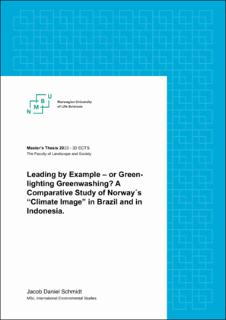| dc.description.abstract | Norway has long been able to portray itself as a “climate frontrunner”, perhaps most notably through its efforts to reduce deforestation rates globally. Yet, the international context is changing, and there are indications that Norway´s carefully crafted reputation or climate image has begun to crack. This thesis explores Norway’s climate image, how it is affected by the relationship between Norway´s green ambitions and its fossil fuel dependency, and in turn, what this dual effect could mean for Norway in the context of a green transition. The thesis compares Norway´s self-image to its image in two key forest partner countries: Brazil and Indonesia.
Through a combination of content analysis and semi-structured interviews with informants mainly from Norway, Brazil and Indonesia, it finds that Norway´s climate image is mixed in all three countries. Findings indicate that there is not much difference in perceptions of Norway´s climate image in Norway, Brazil and Indonesia; rather, the difference is between the official self-image in Norway and that of well-informed professionals. Despite recognition of Norway´s positive contributions to climate issues at the international level, a recurrent theme across all interviews was the perceived double standard and hypocrisy in how Norway pushes for more climate action abroad, yet undermines such efforts domestically by continuing to produce and export fossil fuels. The content analysis suggests a slightly more positive, but still mixed perspective. Furthermore, informants emphasized a broad range of potential implications for Norway by a continued “climate paradox”, including political and economic costs, risk of social instability and polarization, and not least climate risks. Such risks are expected to grow in strength over time, as hopes of reaching stated climate objectives such as the 1.5 ̊ C target in the Paris Agreement decrease. Overall, results show that the image is changing, and that Norway should consider the changing international context going forward. | |
